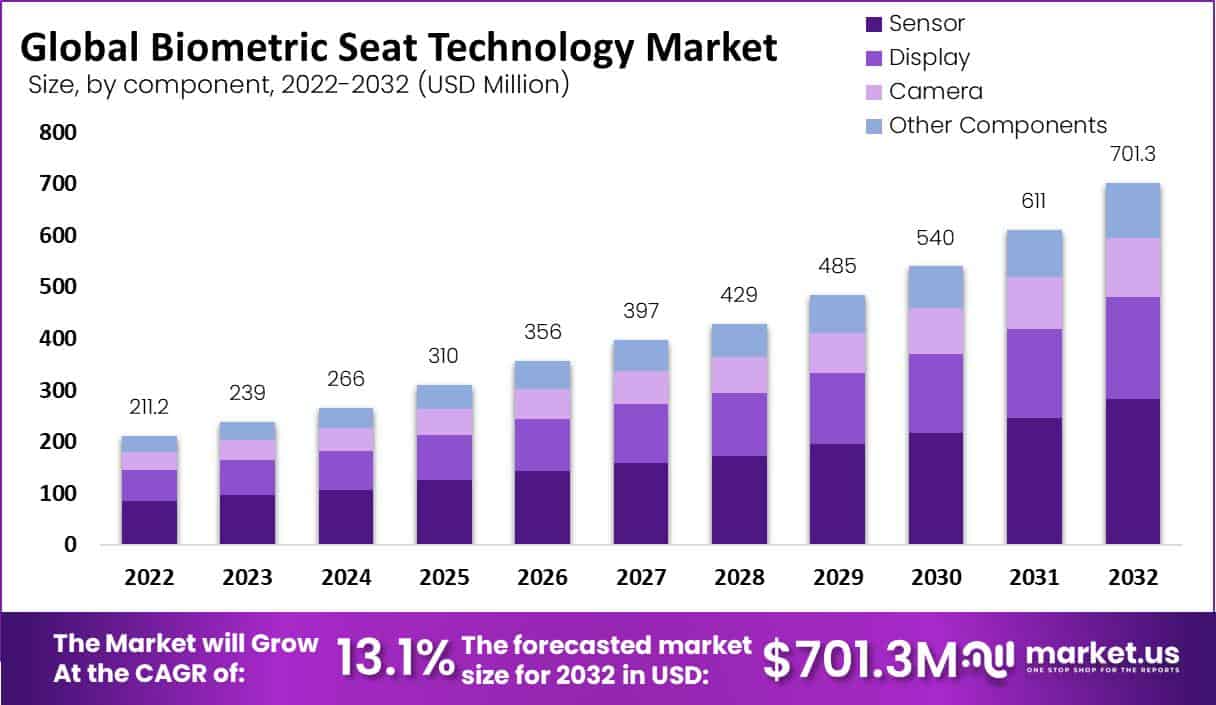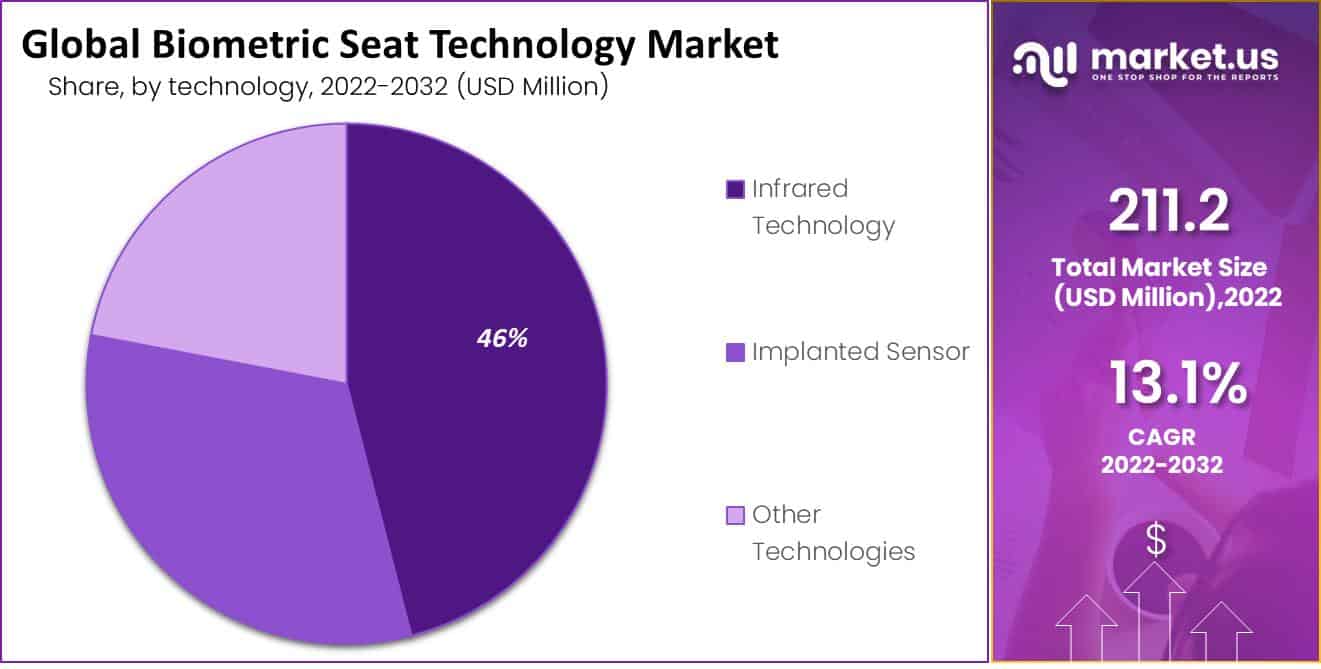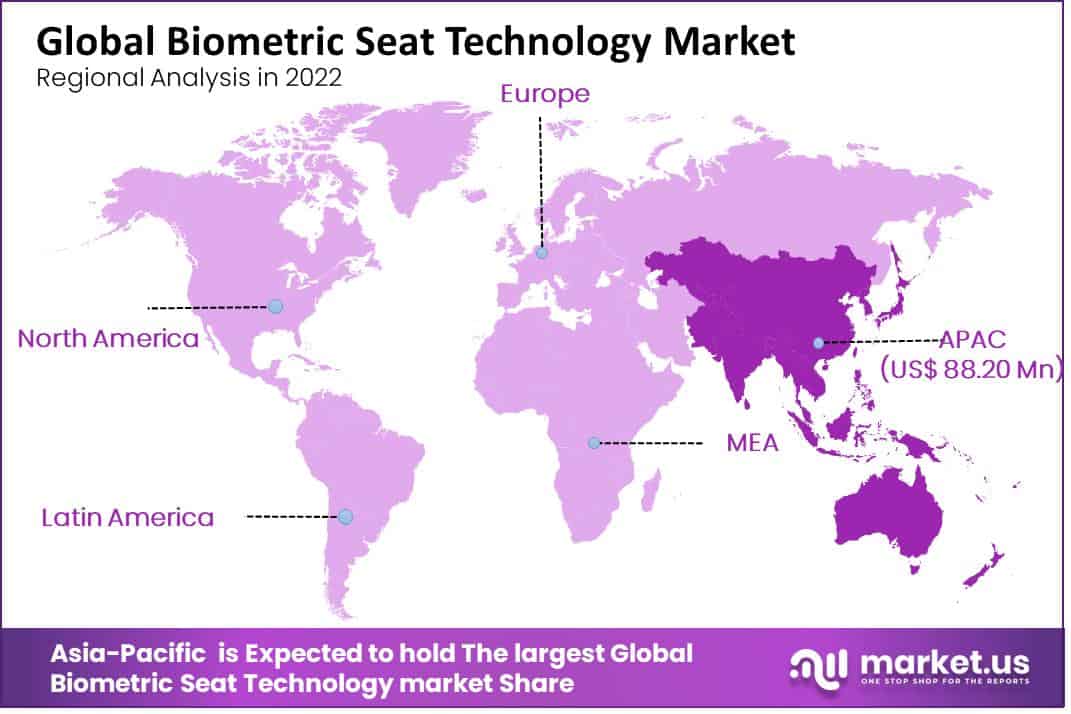Global Biometric Seat Technology Market, By Component (Sensor, and Other Components) By Technology (Infrared Technology, and Other Technologies) By Vehicle Type, By Region and Companies - Industry Segment Outlook, Market Assessment, Competition Scenario, Trends, and Forecast 2023-2032
- Published date: Oct. 2023
- Report ID: 99508
- Number of Pages: 397
- Format:
-
keyboard_arrow_up
Quick Navigation
Report Overview
In 2022, the global biometric seat technology market was valued at USD 211.2 million and is expected to reach USD 701.3 million in 2032. This market is estimated to register a CAGR of 13.1%. The stress level of the driver is measured by biometric seats at the time of driving.
With the help of a sensor, biometric seats are keeping tabs on the driver’s body temperature and heart rate. The steering wheels and seat belts have these sensors installed, which provide computerized speed audible warning, restriction, and the ability to notify emergency services. Biometric seats are aimed to track the driver’s level of stress they experience while driving the car.

Note: Actual Numbers Might Vary In The Final Report
Key Takeaway
- Market Growth Projection: The global biometric seat technology market is expected to reach a substantial value of USD 701.3 million by 2032, reflecting a projected CAGR of 13.1% from 2023 to 2032.
- Functional Benefits of Biometric Seats: Biometric seats in vehicles utilize sensors to monitor crucial driver metrics such as body temperature, heart rate, and stress levels. This data can be used to implement safety features like automated speed warnings, emergency notifications, and stress assessment, enhancing the overall driving experience.
- Driving Factors: The market is driven by increased integration of AI technology and infotainment systems in automobiles. Key industry players, such as Jaguar Land Rover, are investing in facial recognition technology for personalized control settings in vehicles, further propelling the market growth.
- Market Segment Analysis: The sensor segment dominates the market, while infrared technology is anticipated to exhibit the highest growth rate due to its reliable authentication and security features. Passenger vehicles contribute significantly to market share due to increasing demand for luxurious vehicles and heightened consumer awareness regarding safety features.
- Challenges Faced by the Market: High implementation and maintenance costs pose a significant challenge to the market’s growth. Additionally, concerns regarding the security of personal biometric data and the adverse impact of the COVID-19 pandemic on biometric applications have hampered market expansion.
- Regional Growth Trends: The Asia-Pacific region is expected to witness rapid growth, attributed to government initiatives promoting urbanization and increased energy-based consumer demand. North America and Europe are also poised to experience substantial growth, fueled by technological advancements and the rising need for secure and comfortable automotive features.
- Key Industry Players: Leading companies such as ZF Friedrichshafen AG, Robert Bosch GmbH, Denso Corporation, and Continental AG hold significant market shares. These companies leverage their extensive product portfolios and distribution networks to target specific customer segments and enhance their market presence.
- Emerging Trends: The integration of biometric technology in automotive safety features is gaining traction, enabling features such as automatic seat adjustments, real-time data sharing between connected devices, and personalized in-car experiences for passengers. This trend is expected to further fuel market growth.
Driving Factors
The market for biometric seat technology is anticipated to expand due to rising AI technology usage and the addition of infotainment systems in automobiles. The development of biometrics is receiving funding from major automakers and digital firms for a range of applications, including vehicle access, driver monitoring, and personalization.
For instance, Jaguar Land Rover is developing facial recognition technology so that settings in cars can be controlled by a person’s expressions. Infrared technology enables biometric seats to measure the driver’s heart rate using sensors embedded into the seats. Due to the increasing usage of biometric security in cars, vehicle manufacturers are integrating safety and comfort features.
Also, customers are more aware of safety in the vehicles manufacturers can give them better safety features with biometric seats, these factors can drive the market for biometric seat technology. In-car sensors are increasingly used to monitor the emotional state of the driver, including body temperature, breathing rate, and heart rate, which helps to assess their level of stress. The automobile biometric seat industry is expected to expand on a global scale during the projected period.
Restraining Factors
The high cost of implementation and maintenance is one of the key barriers to the market for biometric seat technology. Specialized sensors and software can be expensive for automakers to implement into vehicles, especially in low-cost sections. Additionally, the lack of consumer knowledge about the advantages of biometric seat technology is impeding market expansion. As personal biometric data is gathered and retained, worries about abuse or hacking are raised, and this presents a substantial hurdle for the business. The COVID-19 pandemic has also had an impact on the market since governments have halted biometric applications to stop the virus’ spread.
By Component Analysis
Based on components, the market for biometric seat technology is segmented into sensors, displays, and cameras. Among these components, the sensor segment is dominate the global biometric seat technology market with the biggest market share. The sensors are the most fundamental part of an automobile’s electronic system. Growth in electric and driverless vehicles and technological advancements has increased the demand for sensors in the biometric seat technology market.
By Technology Analysis
Based on technology the market is divided into infrared technology, implanted sensors, and other technologies. Infrared technology is expected to grow with the highest CAGR in the automotive biometrics market in the forecasted period, due to its widespread use for reliable authentication and security.
Additionally, the development of infrared sensors in the automotive sector is being driven by the rising trend toward keyless entry and push-button ignition systems in automobiles. For instance, before the door opens, the user must place the capacitive sensor on the door handle.

Note: Actual Numbers Might Vary In The Final Report
By Vehicle Type Analysis
The market for automotive biometric seat technology has been divided into two categories based on the type of vehicle including commercial vehicles and passenger vehicles. The passenger vehicles section dominates the market with a market of more than 60% and is expected to keep growing due to the rising popularity of luxurious vehicles, technological advancements, and increasing disposable income in developing countries. The market for automotive biometric seat technology is rapidly growing because of the increasing need for more customize security features used by vehicle manufacturers.
Key Market Segments
Based on Component
- Sensor
- Display
- Camera
- Other Components
Based on Technology
- Infrared Technology
- Implanted Sensor
- Other Technologies
Based on Vehicle Type
- Passenger Vehicle
- Commercial Vehicle
- Electric Vehicle
Growing Opportunities
In recent years, the market for biometric seat technology offers numerous prospects for growth. The market is expanding as a result of the increasing demand for vehicle safety and security around the world, and this trend is anticipated to last. As automakers strive to provide the customer with advanced and distinctive features in their vehicles, it is anticipated that the use of biometric technology will rise.
Also, the industry is presented with more opportunities by the increasing demand for premium and luxury vehicles in Europe and Asia Pacific. Additionally, it is anticipated that the market for biometric seat technology will continue to grow because of the rising demand for electric vehicles and the requirement for better safety measures.
Latest Trends
Due to the rising need for sophisticated safety features in automobiles, biometric seat technology is becoming more and more popular among automotive manufacturers and consumers. Technology has made it possible for seat belts to now automatically adapt to the occupant’s size, weight, and position. Moreover, connected automobiles are incorporating biometric seat technology to enable real-time data sharing between connected devices, and vehicles.
This allows features like automated door unlocking based on the occupant’s biometric data, which enhances safety, security, and convenience. The comfort and luxury components of vehicles are also being improved with the introduction of biometric seat technology. Included features like automatic climate control, massage choices, and personalized seat settings based on the occupant’s data.
Regional Analysis
The Asia-Pacific region would grow rapidly. Government programs to promote urbanization and population growth are attributed to the region’s growth because they increase consumer demand for energy-based goods and services. North America has high energy consumption and continued technical developments across all industries are expected to contribute significantly to the region’s growth. Given the rising need for secure and comfortable features in cars, Europe is predicted to hold a sizable share of the worldwide automotive biometric seat technology market. The companies’ extensive research and development resources for biometric seats in vehicles are expected to propel the global market for this technology.

Note: Actual Numbers Might Vary In The Final Report
Key Regions and Countries:
- North America
- The US
- Canada
- Mexico
- Western Europe
- Germany
- France
- The UK
- Spain
- Italy
- Portugal
- Ireland
- Austria
- Switzerland
- Benelux
- Nordic
- Rest of Western Europe
- Eastern Europe
- Russia
- Poland
- The Czech Republic
- Greece
- Rest of Eastern Europe
- APAC
- China
- Japan
- South Korea
- India
- Australia & New Zealand
- Indonesia
- Malaysia
- Philippines
- Singapore
- Thailand
- Vietnam
- Rest of APAC
- Latin America
- Brazil
- Colombia
- Chile
- Argentina
- Costa Rica
- Rest of Latin America
- Middle East & Africa
- Algeria
- Egypt
- Israel
- Kuwait
- Nigeria
- Saudi Arabia
- South Africa
- Turkey
- United Arab Emirates
- Rest of MEA
The global market is extremely competitive due to a large number of competitors. The companies’ market shares might alter as a result of variables like product innovation, price policy, and marketing efforts. Due to their huge product portfolios and efficient distribution networks, ZF Friedrichshafen and Robert Bosch GmbH are two of the market’s leading competitors. The top firms may leverage market categories such as component, vehicle type, technology, and sales channel to target certain clientele and increase their market share.
Market Key Players:
Listed below are some of the most prominent global biometric seat technology industry players.
- ZF Friedrichshafen AG
- Robert Bosch GmbH
- Denso Corporation
- Continental AG
- Hitachi Ltd
- Fujitsu
- Ford Motor Company
- Panasonic Corporation
- Aptiv
- Mitsubishi Electric Corporation
- Synaptics Inc.
- Lear Corporation
- Faurecia
- Other Key Players
Recent Developments
A collaboration between Faurecia and Microsoft to create digital services for the Cockpit of the Future utilizing Microsoft’s Connected Vehicle Platform was announced in 2020. By providing immersive gaming and working experiences, this collaboration aims to redefine the in-car experience for all passengers. Likewise, the automotive sector is progressively incorporating biometric technology for security, safety, and accessibility reasons.
Report Scope:
Report Features Description Market Value (2022) USD 211.2 Mn Forecast Revenue (2032) USD 701.3 Mn CAGR (2023-2032) 13.1% Base Year for Estimation 2022 Historic Period 2016-2022 Forecast Period 2023-2032 Report Coverage Revenue Forecast, Market Dynamics, COVID-19 Impact, Competitive Landscape, Recent Developments Segments Covered Component (Sensor, Display, Camera and Other Components) Technology (Infrared Technology, Implanted Sensor, Other Technologies) Vehicle Type (Passenger Vehicle, Commercial Vehicle, Electric Vehicle) Regional Analysis North America – The US, Canada, & Mexico; Western Europe – Germany, France, The UK, Spain, Italy, Portugal, Ireland, Austria, Switzerland, Benelux, Nordic, & Rest of Western Europe; Eastern Europe – Russia, Poland, The Czech Republic, Greece, & Rest of Eastern Europe; APAC – China, Japan, South Korea, India, Australia & New Zealand, Indonesia, Malaysia, Philippines, Singapore, Thailand, Vietnam, & Rest of APAC; Latin America – Brazil, Colombia, Chile, Argentina, Costa Rica, & Rest of Latin America; Middle East & Africa – Algeria, Egypt, Israel, Kuwait, Nigeria, Saudi Arabia, South Africa, Turkey, United Arab Emirates, & Rest of MEA Competitive Landscape ZF Friedrichshafen AG, Robert Bosch GmbH, Denso Corporation, Continental AG, Hitachi Ltd, Fujitsu Ford Motor Company, Panasonic Corporation, Aptiv, Mitsubishi Electric Corporation, Synaptics Inc., Lear Corporation, Faurecia, Other Key Players Customization Scope Customization for segments, region/country-level will be provided. Moreover, additional customization can be done based on the requirements. Purchase Options We have three licenses to opt for: Single User License, Multi-User License (Up to 5 Users), Corporate Use License (Unlimited User and Printable PDF) Frequently Asked Questions (FAQ)
What will be the market size for Biometric Seat Technology Market in 2032?In 2032, the Biometric Seat Technology Market will reach USD 701.3 million.
What CAGR is projected for the Biometric Seat Technology Market?The Biometric Seat Technology Market is expected to grow at 13.1% CAGR (2023-2032).
Name the major industry players in the Biometric Seat Technology Market.ZF Friedrichshafen AG, Robert Bosch GmbH, Denso Corporation, Continental AG, Hitachi Ltd, Fujitsu, Ford Motor Company, Panasonic Corporation and Other Key Players are the main vendors in this market.
List the segments encompassed in this report on the Biometric Seat Technology Market?Market.US has segmented the Biometric Seat Technology Market Market by geographic (North America, Europe, APAC, South America, and MEA). By Component, market has been segmented into Sensor, Display, Camera and Other Components. By Technology, the market has been further divided into, Infrared Technology, Implanted Sensor and Other Technologies.
 Biometric Seat Technology MarketPublished date: Oct. 2023add_shopping_cartBuy Now get_appDownload Sample
Biometric Seat Technology MarketPublished date: Oct. 2023add_shopping_cartBuy Now get_appDownload Sample -
-
- ZF Friedrichshafen AG
- Robert Bosch GmbH
- Denso Corporation
- Continental AG
- Hitachi Ltd
- Fujitsu
- Ford Motor Company
- Panasonic Corporation
- Aptiv
- Mitsubishi Electric Corporation
- Synaptics Inc.
- Lear Corporation
- Faurecia
- Other Key Players













